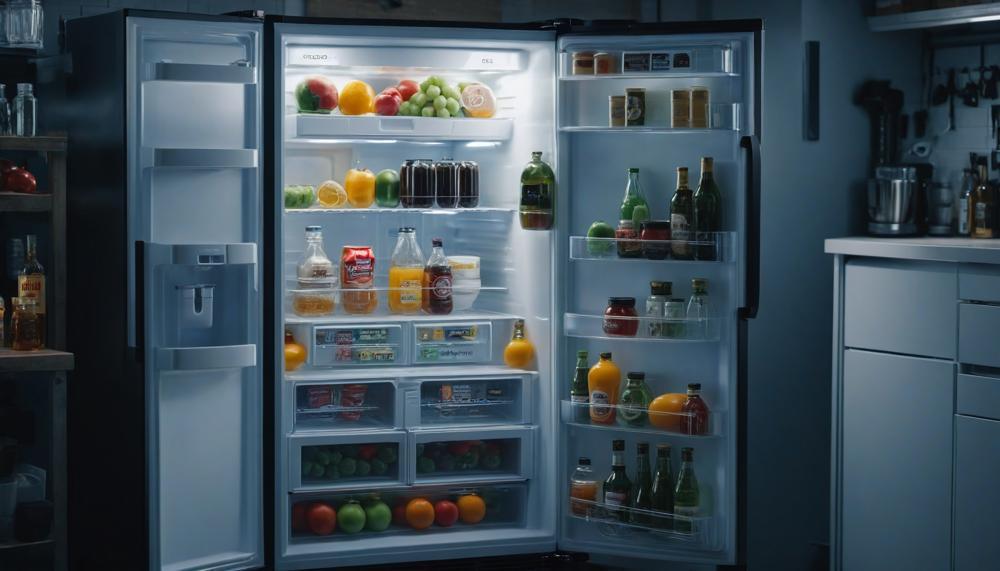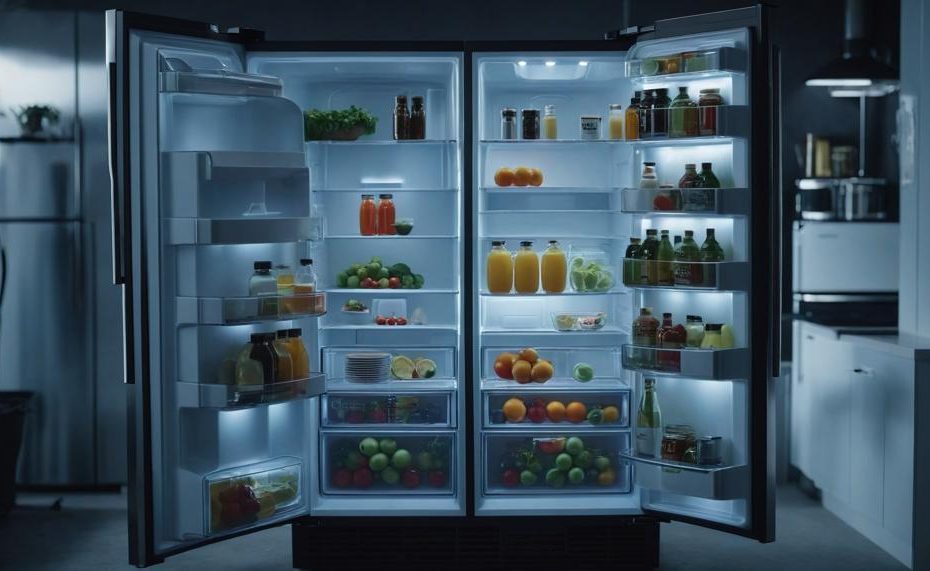Thinking of running a refrigerator in your garage? You might be wondering just how much it’s going to cost you. The answer isn’t straightforward, but let’s break it down.
Typically, a garage refrigerator can add anywhere from $50 to $150 to your annual electricity bill, depending on several factors.
Key Takeaways:

- Direct Cost: Running a garage refrigerator can cost around $50 to $150 per year.
- Factors Affecting the Cost:
- Temperature Variability: Garages often experience extreme temperature changes, which can make your fridge work harder.
- Fridge Efficiency: Newer, energy-efficient models will cost less to run than older, less efficient ones.
- Usage Patterns: The more you open and close the fridge, the harder it has to work.
- Indoor vs. Garage Costs: Garage refrigerators generally cost more to run due to the harsher conditions, unlike indoor models that operate in a climate-controlled environment.
- Money-Saving Tips:
- Insulate Your Garage: This can help maintain a more stable temperature.
- Energy-Efficient Models: Opt for a fridge with a good Energy Star rating.
- Strategic Placement: Keep your fridge away from direct sunlight and other heat sources.
Understanding these factors can help you manage and potentially reduce your running costs. So, while adding a fridge to your garage might seem like a great idea for extra storage, it’s essential to consider these points to keep your energy bills in check.
Contents
Factors Affecting Refrigerator Energy Consumption:
When estimating the cost of running a refrigerator in your garage, several key factors come into play:
| Factor | Details | Impact on Cost |
| Outside Temperature | Fluctuations, Insulation | High |
| Refrigerator Usage | Frequency of Use, Contents | Medium |
| Refrigerator Type and Age | Design, Energy Efficiency | High |
| Electricity Rates | Local Rates | Variable |
| Maintenance | Regular Maintenance | Medium |
| Power Consumption | Wattage, Cost Calculator | High |
By considering these factors, you can better estimate the cost of running a refrigerator in your garage and take steps to minimise your energy expenses.
Calculating Energy Consumption and Costs:
To accurately calculate the energy consumption and costs of running a refrigerator in your garage, follow these detailed steps:
Identify the Refrigerator’s Wattage:
- Check the refrigerator’s specifications label, typically found inside the unit or in the manual, to find its wattage.
- Refrigerators cycle on and off, meaning they do not run at full power continuously. Generally, they operate about one-third of the time. To estimate the daily energy usage:
- Divide the total wattage by 3.
- Multiply this value by 24 hours.
- Convert the result to kilowatt-hours (kWh) by dividing by 1000.
Calculate Daily Energy Consumption:
For example:
Daily Energy Consumption (kWh) = (Wattage / 3) * 24 / 1000
Consider Environmental and Usage Factors:
- Temperature: Higher ambient temperatures increase energy consumption.
- Usage: Frequently opening the fridge door increases energy use.
- Size and Age: Larger or older refrigerators typically consume more energy.
- Estimate Monthly Energy Consumption:
- Multiply the daily kWh by 30 days.
For example:
Monthly Energy Consumption (kWh) = Daily Energy Consumption (kWh) * 30
Calculate Monthly Costs:
- Find your electricity rate (cost per kWh) from your utility bill.
- Multiply the monthly kWh by the cost per kWh.
For example:
Monthly Cost = Monthly Energy Consumption (kWh) * Electricity Rate (per kWh)
Example Calculation:
Suppose your refrigerator uses 150 watts, and your electricity rate is £0.15 per kWh. Here’s how you’d calculate the monthly cost:
| Step | Calculation | Result |
| Daily Energy Consumption | (150W / 3) * 24 / 1000 | 1.2 kWh |
| Monthly Energy Consumption | 1.2 kWh * 30 | 36 kWh |
| Monthly Cost | 36 kWh * £0.15/kWh | £5.40 |
By following these steps, you can get an accurate estimation of the energy consumption and costs of running a refrigerator in your garage.
Cost-Saving Strategies for Running a Garage Refrigerator:
| Strategy | Description | Benefit |
| Choose the Right Size | Select a refrigerator that matches your needs and consider downsizing. | Reduces energy consumption and saves space. |
| Energy-Efficient Models | Opt for top mount refrigerators and Energy Star-rated models. | Improves energy efficiency and lowers running costs. |
| Optimize Usage | Regular maintenance and correct temperature settings. | Ensures efficient operation and longevity. |
| Location Matters | Place in a cool area and consider insulation. | Maintains stable operating environment, reducing energy usage. |
| Smart Features | Use smart plugs and defrost regularly. | Monitors and controls energy usage effectively. |
What Size Air Conditioner Do I Need for My Garage?
To determine the right size air conditioner for your garage, you need to consider the square footage of the space. Here’s a step-by-step guide to help you calculate and choose the appropriate air conditioner:
Measure the Square Footage
- Measure the length and width of your garage.
- Multiply the length by the width to get the square footage. For example, if your garage is 20 feet long and 15 feet wide, the square footage is 300 square feet (20 x 15 = 300).
Calculate the BTUs Needed
- Use the rule of thumb: multiply the square footage by 20 to determine the required BTUs (British Thermal Units).
- For a 300 square foot garage, you would need a 6,000 BTU air conditioner (300 x 20 = 6,000).
Consider Additional Factors
- Climate: In hotter climates, you might need more BTUs.
- Insulation: Poorly insulated garages require more cooling power.
- Usage: If you frequently use heat-generating equipment, you may need additional capacity.
Here’s a quick reference table to help you determine the BTUs based on square footage:
| Square Footage | BTUs Needed |
| 100 – 150 | 2,000 – 3,000 |
| 150 – 250 | 3,000 – 5,000 |
| 250 – 350 | 5,000 – 7,000 |
| 350 – 450 | 7,000 – 9,000 |
| 450 – 550 | 9,000 – 11,000 |
Consult a Professional
For a precise assessment, it’s advisable to consult with a professional HVAC technician. They can take into account all variables and ensure you get the optimal air conditioner for your needs.
Research and Compare
When purchasing, look for units with high SEER ratings and Energy Star labels for efficiency.
Compare prices and reviews from various sources to make an informed decision.
Conclusion
Running a refrigerator in your garage can significantly impact your electricity bill, with costs ranging from $50 to $150 annually. This expense varies due to several critical factors.
- Temperature Variability: Garages typically experience more extreme temperature fluctuations compared to indoor spaces. This forces the refrigerator to work harder, especially during hot summers and cold winters, increasing energy consumption.
- Refrigerator Efficiency: Newer, energy-efficient models are designed to handle these fluctuations better and consume less power. In contrast, older models may struggle and use more electricity.
- Usage Patterns: The frequency of opening the refrigerator door also affects its energy consumption. Each time the door is opened, the fridge has to restore its internal temperature, thus using more energy.
- Garage vs. Indoor Costs: A refrigerator in a garage generally incurs higher running costs compared to one inside the house due to harsher environmental conditions.
- Money-Saving Tips: Insulating your garage can help maintain a stable temperature, reducing the workload on your refrigerator. Opting for an energy-efficient model and placing it away from direct sunlight can further help minimize energy use.





